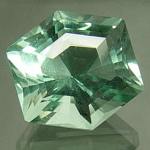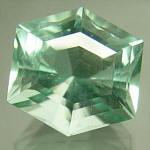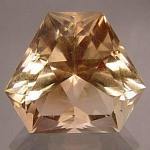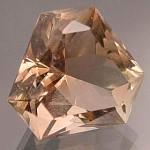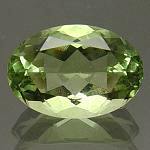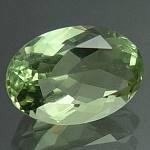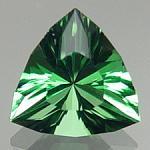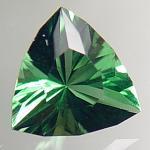|
ClassicGems.net |
|
|
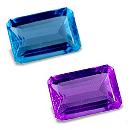 |
|
Fluorite |
|
|
Discovered in 1529; IMA status: Valid (pre-IMA; Grandfathered) |
|||
|
|
|
Chemistry |
|
|
|
|
|
CaF2 |
|
|
|
Calcium Fluoride |
|
Molecular Weight: |
614.71 gm |
|
Composition: |
Calcium |
51.33 % |
Ca |
71.83 % |
CaO |
|
|
Fluorine |
48.67 % |
F |
48.67 % |
F |
|
|
― |
― % |
O |
-20.49 % |
-O=F2 |
|
|
|
100.00 % |
|
100.00 % |
= TOTAL OXIDE |
|
|
|
||||
|
Classification |
|
|
|
|
|
Halides |
|
|
3/A.08-10 |
|
|
|
3 : HALIDES |
|
Related to: |
Fluorite Series and related compounds |
|
|
|
|
Crystal Data |
|
|
|
|
|
Cubes, octahedra, rarely dodecahedra, or combinations, with many other forms; rounded or stepped, to 2 m; nodular, botryoidal, rarely columnar or fibrous; granular, massive. |
|
|
Common on [111], interpenetrant, flattened, also as contact twins. |
|
|
|
|
|
Physical Properties |
|
|
|
|
|
[111] Perfect, [111] Perfect, [111] Perfect |
|
|
Sub-Conchoidal to Uneven |
|
|
Brittle |
|
|
4.0 |
|
|
Hardness (Vickers): |
VHN100=174 - 181 kg/mm2 |
|
3.175 - 3.184 (g/cm3) (3.56 if high in rare-earth elements) |
|
|
Fluoresces blue under LW UV. May also fluoresce red, pink or white depending on origin of specimens. May also be phosphorescent, thermoluminescent or Triboluminescent. |
|
|
Not Radioactive |
|
|
Other: |
Slightly soluble in water (0.016 grams per liter at 18°) |
|
|
|
|
Optical Properties |
|
|
|
|
|
Colorless, White, Purple, Blue, Green, Yellow, Orange, Red, Pink, Brown, Bluish Black; commonly zoned |
|
|
Transparent to Translucent |
|
|
Vitreous, Dull |
|
|
1.432 - 1.448 Isotropic |
|
|
0.000 (Isotropic) (Frequently exhibits very weak anomalous birefringence, especially in cleaved, cut or pressed crystals) |
|
|
0.007 (very, very low) |
|
|
None |
|
|
|
|
|
Occurances |
|
|
|
|
|
Geological Setting: |
An accessory mineral in granite, granite pegmatites, syenites; around fumaroles; in carbonatites and alkaline intrusives. Economic deposits in low- to high-temperature hydrothermal veins and stratabound deposits; a cement in sandstones. |
|
Common Associations: |
Apatite, Barite, Calcite, Cassiterite, Celestine, Dolomite, Quartz, Scheelite, Sulfides, Topaz, Wolframite |
|
Common Impurities: |
Y, Ce, Si, Al, Fe, Mg, Eu, Sm, O, ORG, Cl, TR |
|
Co-type Localities: |
Jáchymov (St Joachimsthal), Ostrov, Krušné Hory Mountains, Karlovy Vary Region, Bohemia, Czech
Republic; and |
|
Year Discovered: |
1529 |
|
View mineral photos: |
|
|
|
|
|
Unusual Gem Categories |
|
|
|
|
|
|
Fluorescent Gems, Phosphorescent Gems, Thermoluminescent Gems, Triboluminescent Gems |
|
|
|
|
More Information |
|
|
|
|
|
|
|
|
|
|
|
Fluorite is often called the "most colorful mineral in the world." The most common examples of Fluorite are the banded, multi-color gems with various shades of yellows, greens, blues, purples and browns. Fluorite is also available in fine, gem quality solid colors. The most popular of these is deep purple that can rival the best Amethyst colors. Other colors include neon green, blue and a beautiful and very rare near-colorless gem. Color change Fluorite is also available in gems that change from blue to purple-pink or from shades of green to red. Fluorite is too brittle to wear in jewelry because of its easy, perfect octohedral cleavage in four directions. Fluorite fluoresces blue under longwave UV light. It may also fluoresce red, pink or white depending on the origin of the specimens. Fluorite may also be phosphorescent, thermoluminescent or Triboluminescent. Fluorite was named in 1797 by Italian mineralogist Carlo Antonio Galeani Napione (1756-1814) from the Latin word fluere, meaning to flow, because it melts easily and is used as a flux in smelting. Napione was the author of the first Italian treatise on Mineralogy, the Mineralogy Elements printed in Turin in 1797. The word fluorescence is derived from the name Fluorite, which often exhibits this phenomenon. The element fluorine also derives its name from Fluorite, a major source of the element. There are many sources of Fluorite crystals in the US and worldwide. |
|
|
Fluorite gems for sale:
|
||||||||||||||||||||||||||||||||||||||||||||||||||||||||||||||||||||||||||||||||||||||||||||||||||||||||||||
